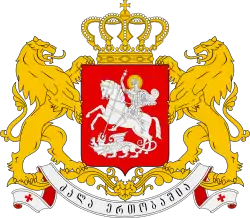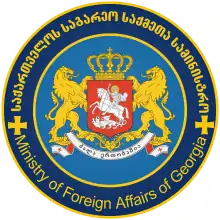Ministry of Foreign Affairs of Georgia
The Ministry of Foreign Affairs of Georgia (Georgian: საქართელოს საგარეო საქმეთა სამინისტრო, transliteration: sakartvelos sagareo sakmeta saministro) is a governmental body of Georgia responsible for protecting and promoting Georgia’s interest and its persons and entities abroad. The Ministry is led by the Minister of Foreign Affairs who is nominated by the Prime Minister of Georgia as a member of cabinet, followed by the approval of the Government by the Parliament of Georgia. The position is currently held by David Zalkaliani, in office since 21 June 2018.
| საქართველოს საგარეო საქმეთა სამინისტრო | |
 Coat of arms of Georgia | |
 Logo of MFA | |
| Agency overview | |
|---|---|
| Formed | May 25, 1918 |
| Headquarters | Sh. Chitadze str. 4, Tbilisi, Georgia 0118 |
| Annual budget | ₾136,500,000 (2019) (~€40,000,000) |
| Agency executive |
|
| Website | www.mfa.gov.ge |
Activity
Georgia's foreign service – the Ministry of Foreign Affairs, Diplomatic Missions and Consular Services - serve fundamental national interests and values anchored in the Constitution of Georgia, the Foreign Policy Strategy as well as the National Security Concept. The Ministry drives Georgia’s foreign policy to enhance the security and international status of the country, and promote its interests in an increasingly globalizing world.[1]
Democratic Republic of Georgia
The Ministry of Foreign Affairs was established on 26 May 1918, the same day Georgia declared its independence. Consequently, the foreign affairs commission, diplomatic missions, and other entities necessary for carrying out diplomatic work were formed abroad. The first Foreign Minister was Akaki Chkhenkeli,[2] a political leader. In November 1918, Evgeniy Gegechkori was appointed as the Minister of Foreign Affairs.
The Ministry of Foreign Affairs was the main foreign policy agency of the Democratic Republic of Georgia. It held diplomatic negotiations on behalf of the government. The Ministry was accountable to the Parliament. The staff of the Ministry did not exceed 50 people and its structure was the following:[3]
- The Minister of Foreign Affairs - Director of the Ministry, Deputy Director, Legal Counsel, Secretary of the Minister.
- Personnel Department - the Head of the Personnel Department of the Minister, executive secretary, driver.
- Political Department - the Head of the Department, the Head of the European Division, the Head of the Asian Division, executive secretaries of the divisions, chancelleries and translators.
- General Department - the Head of the Department, executive secretary and his assistant, chancellery.
- Information Bureau - the Head of the Department, executive secretary, chancellery and translators.
Structure of the Ministry of Foreign Affairs of Georgia[4]
- Minister's Secretariat
- Internal Audit Department
- Division of Classified Document Management
- Ambassadors at Large
General Directorate of Information and Public Relations:
→ Press and Information Department
→ Strategic Communications Department
General Directorate of European Integration:
→ Department of European Integration
→ Department of EU Assistance Coordination and Sectoral Integration
- Department of Human Resources Management
- Political Department
- Department of Security of Georgian Diplomatic Representations and Consular Offices Abroad
- Department of European Affairs
- Department of the Americas
- Department of NATO Integration
- Department of International Cultural and Humanitarian Relations
- Department of Diplomatic Protocol
- Department of International Law
- Department of Legal Issues and Relations with Parliament
- Consular Department
- Political Department
- Department of International Organisations
- Department of Neighbouring Countries
- Department of International Economic Relations
- Department of the Middle East and Africa
- Department of Asia and The Pacific
- Administrative Department
- Department for Relations with Diaspora
- IT Department
Legal Entities of Public Law
o LEPL - Information Center on NATO and EU
LEPL Information Center on NATO and EU was established in 2005 and, since 2017, operates under the Ministry of Foreign Affairs of Georgia.[5] The Information Centre on NATO and EU aims to support Georgia’s European and Euro-Atlantic integration process through public diplomacy and strategic communication efforts, primarily focusing on maintaining and increasing knowledge-based public support towards the country's top foreign policy priorities - Georgia’s membership to the North Atlantic Treaty Organization and to the European Union.
o LEPL - Levan Mikeladze Diplomatic Training and Research Institute
The goal of The Levan Mikeladze Diplomatic Training and Research Institute (DTRI) of the Ministry of Foreign Affairs of Georgia (MFA) is to promote the continuous professional development of MFA staff and those forming the diplomatic reserve, taking into consideration Georgian foreign policy priorities, existing needs and trends. The Centre also aims to raise the awareness of foreign diplomats accredited to Georgia and strengthen the capacity of public officials working in the area of international relations.
o LEPL - Bureau of Translation of International Agreements
List of Ministers (since 1918)
Ministers of Foreign Affairs of Democratic Republic of Georgia
- Akaki Chkhenkeli, May 25, 1918 – 1918
- Evgeni Gegechkori, 1918–1921
People's Commissars of Foreign Affairs of Georgian SSR
- Alexander Svanidze, 1921–1923
- Georgi Kiknadze, 1944–1946
Ministers of Foreign Affairs of Georgian SSR
- Georgi Kiknadze, 1946–1953
- Archil Gigoshvili, 1953–1954
- Mitrofan Kuchava, 1954–1962
- Archil Gigoshvili, 1962–1969
- Georgi Chogovadze, 1969–1970
- Revaz Pruidze, 1970–1970
- Shalva Kiknadze, 1970–1979
- Teymuraz Gordeladze, 1979–1981
- Giorgi Javakhishvili, 1985–1990
| Name | From | Until | Political Party |
|---|---|---|---|
| Giorgi Khoshtaria | 26 November 1990 | 15 September 1991 | |
| Murman Omanidze | 15 September 1991 | 31 December 1991 | Independent |
| Alexander Chikvaidze | 2 March 1992 | 21 December 1995 | |
| Irakli Menagarishvili | 15 December 1995 | 29 November 2003 | |
| Tedo Japaridze | 30 November 2003 | 20 March 2004 | |
| Salome Zourabichvili | 20 March 2004 | 19 October 2005 | |
| Gela Bezhuashvili | 19 October 2005 | 31 January 2008 | United National Movement |
| David Bakradze | 31 January 2008 | 22 April 2008 | United National Movement |
| Ekaterine Tkeshelashvili | 5 May 2008 | 6 December 2008 | United National Movement |
| Grigol Vashadze | 6 December 2008 | 25 October 2012 | United National Movement |
| Maia Panjikidze | 25 October 2012 | 5 November 2014 | Free Democrats |
| Tamar Beruchashvili | 11 November 2014 | 1 September 2015 | |
| Giorgi Kvirikashvili | 1 September 2015 | 30 December 2015 | Georgian Dream |
| Mikheil Janelidze | 30 December 2015 | 13 June 2018 | Independent |
| David Zalkaliani | 21 June 2018 | Present | Georgian Dream |
References
- "საქართველოს საგარეო საქმეთა სამინისტრო - წლიური ანგარიშები". mfa.gov.ge. Retrieved 2020-09-22.
- "Akaki Ckhenkeli". Akaki Ckhenkeli. Retrieved 2020-09-22.
- "საგარეო საქმეთა სამინისტრო (1918-1921) - NPLG Wiki Dictionaries". www.nplg.gov.ge. Retrieved 2020-09-22.
- "საქართველოს საგარეო საქმეთა სამინისტრო - Structure". mfa.gov.ge. Retrieved 2020-09-22.
- "Public Information » Infocenter". old.infocenter.gov.ge. Retrieved 2020-09-22.
